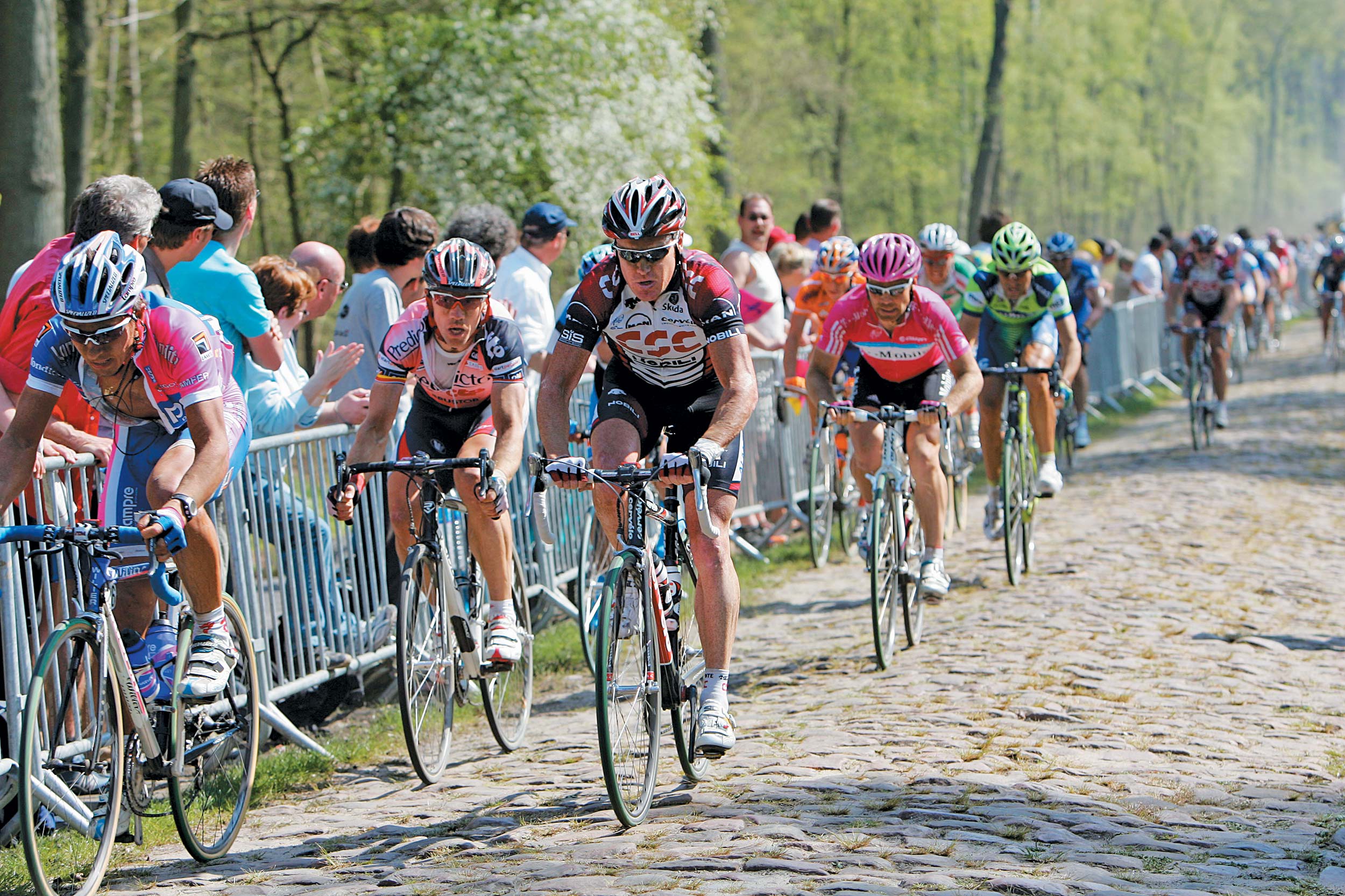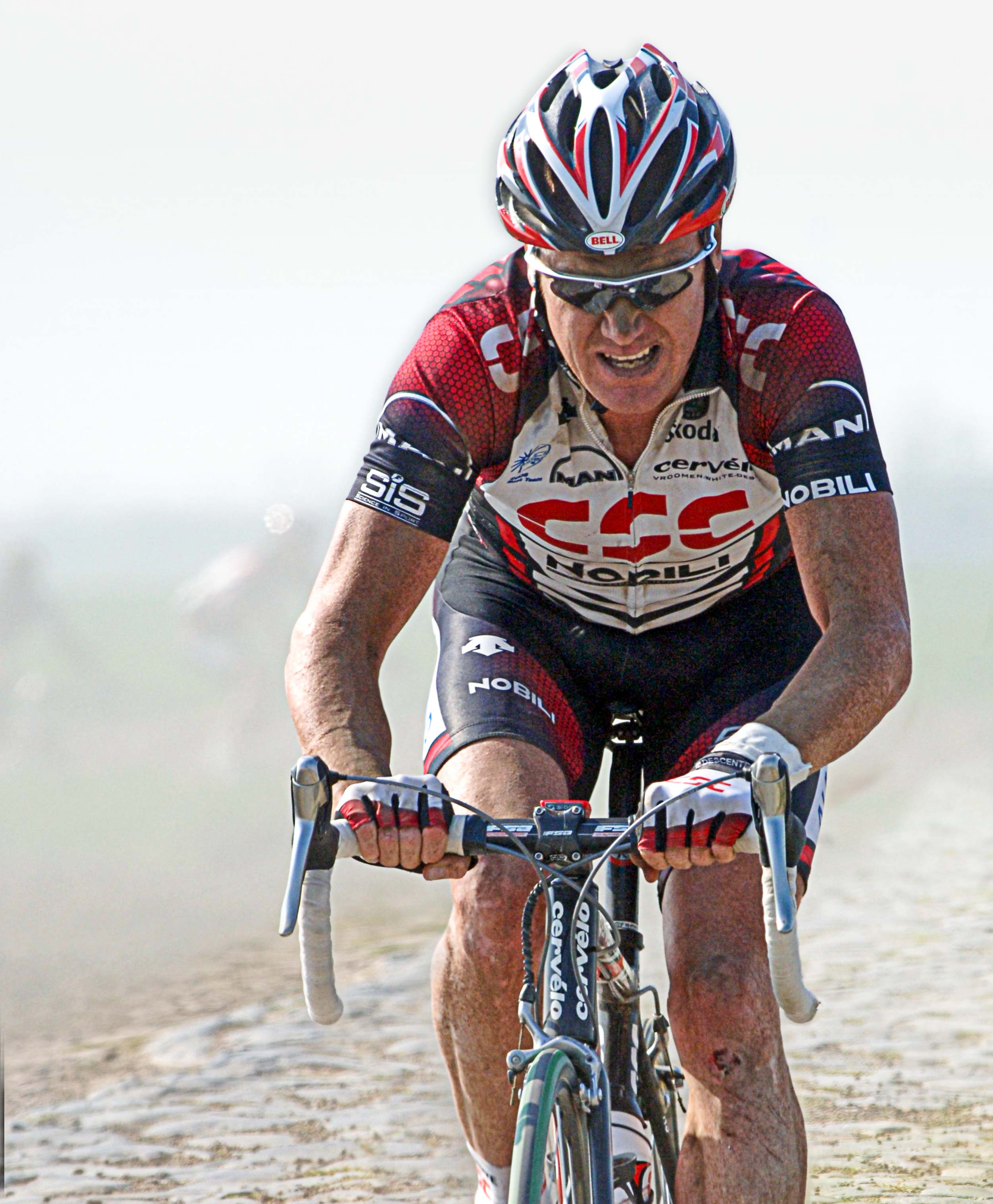Rounding out the mini-series on Paris-Roubaix of 2007, when an Australian won the Classic one-day race for the first time, we look back at an interview with Stuart O’Grady that James Startt conducted moments after his triumph was sealed.

– This interview was originally published in RIDE Cycling Review 36 (April 2007) –
While still feeling the pain of 259 kilometres of racing on some of the roughest roads of any bike race, Stuart O’Grady caught up with James Startt to answer a few questions about his historic victory in Paris-Roubaix.
RIDE Media: This victory has been a long time coming. How does it feel knowing that your name is in the history books as the first Australian to win one of cycling’s real monuments?
Stuart O’Grady: “Winning Paris-Roubaix has been a dream from the moment I started cycling.
“It’s taken a long time, loads of preparation, many kilometres of training and racing and a heap of sacrifices. Hell, this year I’ve hardly been home.
“There’s a lot involved in being completely ready for this week. So to actually go out and win it is unbelievable!”
RIDE Media: Was Paris-Roubaix the ultimate race for you, or would you be happy with winning any of these Classics?
Stuart O’Grady: “To be honest I was probably more prepared for the Tour of Flanders and thought that I’d have a really decent crack at that and Milan-San Remo as well this year. I would then be able to help Fabian Cancellara defend his title in Roubaix.
“In the weeks leading up to the race his form had gone through the roof. We’ve been room-mates for quite a while now and seeing how motivated he was for this race was almost scary. I didn’t want to get in the way of that so I went into Paris-Roubaix 100 per cent committed to helping him.
“But as has happened in the past, you can win these races yourself… even if you’re working for another rider. Look at Servais Knaven at Quickstep a few years ago.
“This year we rode a perfect race. It’s just that Fabian wasn’t having a great day and you can’t be just 99 per cent to win races like Roubaix.”
RIDE Media: Especially when you’re a favourite like he was…
“Yeah, plus I think the heat really hurt him. When I found out it was going to be 27 or 28 degrees Celcius, however, I was probably the happiest man in the peloton!”
RIDE Media: Fabian wasn’t the only one who dreamt of winning…
Stuart O’Grady: “Don’t get me wrong – I knew my form was good and I’ve always dreamed of winning Roubaix. Coming into the velodrome like I did was amazing. But when you’re on a team with a guy like Cancellara, you’ve got to play your card second.
“Eventually he gave me the all clear and I didn’t have to ask twice. I was ready to launch.
“Actually I was pretty pissed off after Flanders because I had really good legs but the race just didn’t turn out the way I expected. I finished 10th but should have been on the podium. I probably wasn’t aggressive enough: I’ve also never seen a Tour of Flanders with 70 guys at the finish. There was no wind, and in Belgium that’s just weird.
“In the warm weather guys were also finding it easier to sit on wheels… and it needed to be a harder race for me to really shine.”
RIDE Media: You’ve ridden well before but never quite been in the finale.
Stuart O’Grady: “My best place was about 14th or 15th and on at least three occasions I should have been in the top 10 but I punctured at a vital moment or something like that. In Paris-Roubaix I flatted at an important stage, but I was at the front.”
RIDE Media: You actually punctured in the Arenberg while in the early break before being caught by the main group and attacking again…
Stuart O’Grady: “Yeah, and in the past I’d have probably made some suicidal move to get back to the escape. But this time I thought, ‘Oh well, I flatted and I can’t change it.’
“So I just took it easy, made time to eat and drink and waited for the pack to catch me.
“Then a couple of sectors later we were supposed to attack but I crashed and that put me behind again.
“The next time I caught up to the pack and went through it, I realised that guys like Peter van Petegem and others were just hammered. I looked at them and went by.
“It was at this moment that Fabian asked how I was and told me he wasn’t 100 per cent.
“I said I was feeling good so I went straight away.
“My team-mate Lars Michaelsen and Juan-Antonio Flecha were already up the road but when we caught them [with Stefan Wesemann] I knew it was The Moment because everybody was sitting up and drinking. They all seemed really wasted.”
RIDE Media: At 33, you’ve been knocking on the door for years. Did you ever just think that maybe the ‘big win’ wasn’t coming?
Stuart O’Grady: “No, never. I’ve always believed I could do it. And I wouldn’t be racing today if I couldn’t win Classics. It’s my sole focus now so I was really confident that it could happen.
“As you say, I’ve been knocking on the door but that didn’t discourage me. Quite the opposite. It just added fuel to the fire and gave me confidence that one day I could pull it off.
“The more I’ve ridden the Classics, the more experience I’ve gained and the easier it is to do them. And as time has passed I’ve realised that there are really only about 10 guys that can win this race.
“After 220km, 90 per cent of the peloton have had their legs chopped off. It’s dawned on me this past year that I am the older-ranking pro now, one of the real Classics riders.
“It’s actually been building for a couple of years; since I finished third in the Tour of Flanders in 2003. But in 2004 my team didn’t do the Classics. In 2006 a crash in Tirreno-Adriatico took me out. Last year I finished second in Züri-Metzgete late in the season and I realised that the harder the race was the better I performed.”
RIDE Media: You also spent a long time focusing on trying to win the green jersey at the Tour de France…
Stuart O’Grady: “That was definitely a factor. Last year, for the first time, I didn’t concentrate on the green jersey and it was one of the easiest Tours of my career. I finished the three weeks and I wasn’t stressed because there weren’t all those sprints to do every day for three weeks. That takes its toll.”
RIDE Media: Having spent more than 10 years racing for French teams you’re in a unique position to observe French cycling. What’s the situation and why aren’t things working?
Stuart O’Grady: “I spent nine years with Roger Legeay at Gan and Crédit Agricole before moving to Cofidis. I don’t have any regrets. That’s a long time on one team so I simply needed to move on. And I had a good first year with Cofidis but my last season there I just felt I had to get out.
“The Classics were what I wanted to do and I was getting frustrated. I was bothered at being the only rider left from my team in the last 100km of those races – I just started becoming blasé.
“I felt that if it wasn’t important to them then why should it be a priority for me?
“If you’re around people who aren’t doing their job 100 per cent then it’s just natural that after a certain time it will start rubbing off on you. And when I saw it happening I knew I had to move on.
“I needed to be on a team that wanted to get the most out of me and was willing to give me the best.”
RIDE Media: Do you think that it’s an issue of French teams lacking tradition when it comes to the Classics?
Stuart O’Grady: “No, it’s the opposite. They certainly have the tradition. I hate to say it, but I think they are lazy.
“Arriving at CSC I couldn’t believe the difference in a bike team. Simple things like training methods. In the French squads everybody is just cruising along. The riders have good salaries, there’s a pleasant ambiance and you go from one race to another that way.
“In addition the riders are searching for the next start too much, so you overpay a young kid and are happy when he wins the Four Days of Dunkirk or something like that. It’s very complicated, really.
“I mean, the riders fight so hard just to get on the Tour de France team that they are stuffed when the Tour finally begins. Things like that.
“There isn’t the sacrifice. Being at Team CSC I see it: there’s a talent pool.
“You’ve got Schleck or Cancellara, and if you aren’t 100 per cent then there are two or three guys willing to pop down the road.
“Everybody is honest and willing to work for each other, and I think that is something lacking in the French teams. It might not be very diplomatic to say such things and I’m not trying to discredit anybody, but the situation is complicated.
“If you want to make up excuses this is a pretty easy sport to do so, but if the riders aren’t motivated that’s the end of the story. Until guys realise that there is more than the month of July there are going to be problems.
“That said there are a lot of good things happening – a lot of strong teams, great directors and plenty of big races at their doorstep. At the moment they are lacking a notable champion and that’s really hurting them…”
RIDE Media: What’s next for the winner of this year’s Paris-Roubaix?
Stuart O’Grady: “Winning Classics… more Classics! Besides the fact that my body feels like it has just been in a car wreck, I really know that I could pretty much win any of them – I’ve only just started my collection.”
– Interview by James Startt (15 April 2007)
– More on Paris-Roubaix 2007: Race Review • Equipment Review: Cervélo R3 –



